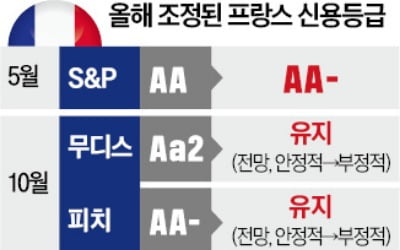[대학생을 위한 비즈니스 영어] 'Europe's Bright...'
-
기사 스크랩
-
공유
-
댓글
-
클린뷰
-
프린트
[ Europe's Bright Light Will Soon Burn Out ]
France surprised most analysts by surpassing growth expectations for the third quarter. But the supports for that growth were short-lived. And when compared to a year ago, the economy has slowed to its lowest rate in four years.
Real gross domestic product rose 0.5% from the second quarter to the third, better than the 0.3% projected. Consumer spending soared by 1.1% . But because business investment and foreign demand have been sagging all year, French real GDP last quarter stood only 2% above its year-ago level, the slowest annual growth rate since 1997.
Moreover, growth is weakening this quarter, and real GDP in 2002 will struggle to grow 2%. That's because the consumer spending spree was lifted by tax rebates and tax-rate cuts that gave households more income to spend. These stimulus programs will not be repeated soon.
The consumer outlook is also dimmed by slack demand for labor. The jobless rate edged up to 8.9% in October, an eight-month high, with a further rise expected.
In addition, consumer inflation outside energy is accelerating. While overall inflation slowed to 1.7% in the year ended in October, compared to 2% a year ago, nonfuel prices rose 2.3%, much faster than their rate of 1.1% in October, 2000. Weighed down by rising unemployment and shrinking buying power, consumer demand is dropping. Household purchases of manufactured goods fell 0.4% in October from September, when they dipped 0.1%.
France's economic gain is a bright spot for the euro zone since it offset some of the drag coming from Germany, whose economy hasn't grown since the first quarter.
-----------------------------------------------------------------------------
[ 곧 사그라질 유럽의 밝은 등불 ]
프랑스는 예상치를 능가한 3분기 경제성장률로 대부분의 애널리스트들을 놀라게 했다.
그러나 프랑스의 예상밖의 성장에 버팀목이 됐던 요인들의 생명은 짧았다.
또 1년전과 비교할때 프랑스 경제성장률은 4년만의 최저 수준으로 낮아진다.
3분기 실질 국내총생산(GDP)은 2분기에 비해 0.5% 늘어나 예상치인 0.3%를 웃돌았다.
소비자 지출은 1.1%나 늘어났다.
그러나 올들어 내내 부진한 기업투자및 해외수요로 국내총생산은 전년 동기에 비해 겨우 2% 증가하는 데 그쳤다.
이는 1997년이래 가장 낮은 연간 성장률이다.
더우기 지금의 4분기들어서는 성장세가 약해지고 있으며 2002년 실질 GDP도 가까스로 2% 늘어나는 데 그칠 전망이다.
이는 소비지출붐이 일반 가정의 가처분 소득을 늘려준 세금환급및 감세에 의해 일어났기 때문이다.
이러한 경기부양책이 가까운 시일내에 다시 펼쳐지지는 않을 것이다.
소비자 전망 또한 인력수요 위축으로 밝지가 않다.
실업률은 지난 10월에 8개월만의 최고치인 8.9%로 높아졌으며 앞으로 더 올라갈 것으로 보인다.
이와함께 에너지를 제외한 소매물가 상승률(인플레이션)은 급격히 높아지고 있다.
올들어 지난 10월까지 전체 물가상승률은 1년전의 2%에서 1.7%로 둔화됐지만 연료부문을 제외할 경우 2.3%에 이른다.
작년 10월의 1.1%에 비해 상당히 높은 수준이다.
실업증가와 구매력감소에 눌려 소비자 수요는 감소하고 있다.
지난 10월 일반 가정의 공산품 구매는 전달에 비해 0.4% 줄었다.
9월에는 0.1% 감소했다.
프랑스경제의 확대는 유로존의 밝은 면으로 독일경제 침체에 따른 유로존의 경기둔화세를 어느 정도 보충해 준다.
독일경제는 지난 1분기이래 성장하지 않고 있다.

